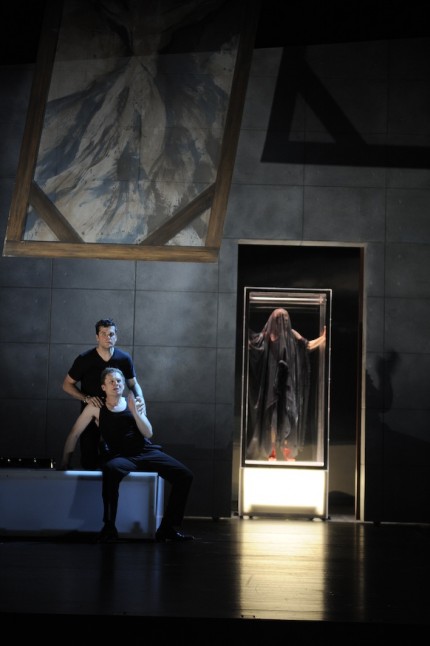COT opens season with a mixed Chicago debut for Glass’s “Usher”

“You know that good luck saying about opening night?” asked Andreas Mitisek standing on crutches on the stage of the Harris Theater, with one leg in a splint.
The new general and artistic director of Chicago Opera Theater slipped on the ice days earlier and broke his leg, which, the Austrian conductor joked, seemed to insure great success for COT’s first production under his leadership.
Would that were so. Mitisek and the company deserve great credit for their daring and offbeat programming, and the fact that his first COT season kicked off with a local Philip Glass premiere is laudable by itself.
And while the performance of Glass’s The Fall of the House of Usher, which opened Saturday night, had several positive elements going for it, it also had plenty of negatives, making for a decidedly mixed leadoff show for the new team at COT.
The Fall of the House of Usher is inspired by Edgar Allan Poe’s short story about the haunted goings-on at the title mansion where insanity and family secrets lurk in dark corners. Written in 1987, Glass’s 90-minute opera is cast in the composer’s most user-friendly style, insistent pulsing minimalist riffs in the small pit ensemble set against lyrical vocal writing for the three principals. Glass’s music has an eerie and ominous quality that suits Poe’s brand of vintage American gothic, twining with the great writer’s unsettling existential dread like a well-tailored glove.
The problem with COT’s Usher is a misguided production that seems to get almost everything imaginable wrong from the get-go. Director Ken Cazan’s staging is literal and heavy-handed when it should be subtle and allusive, and opaque and confused when it needs to be clear and linear.
Instead of conveying the mystery and murky evocative style of Poe, Cazan, in ham-handed fashion, brings what he sees as sexual subtexts front and center. When we first see the Usher siblings Madeleine Usher is groping her brother Roderick. Later, as she sings a high-flying aria, Roderick appears to be masturbating under his cloak. While the incest theme is certainly plausible in Poe’s dark tale, Cazan goes a step further and posits that the narrator William and Roderick are in fact gay lovers rather than just friends, and the central conceit is a menage a trois between the Usher siblings and William.
Even that conceit is possible but it would take a director with more finesse and thoughtfulness than Cazan to pull it off. Instead we get make-out scenes between the two men, and couplings of the trio in every combination possible. At times Cazan seems to be turning Poe’s creepy tale into a kind of revisionist paean to gay self-actualization, which, in its simplistic reductive fashion, does a disservice to both Poe’s story and Glass’s music.
The jumbled mix of periods don’t work at all. William reads Roderick’s letter on an iPad, and travels to see him on a plane while Glass’s music sturdily conveys the rhythm of a horse-driven carriage ride. Especially bizarre is having the stagehands/extras decked out in punk gear with elaborate mohawk haircuts. If Goth club kids’ regalia is supposed to be out there and cutting edge, it’s about 35 years too late. Cazan surrounds the principals with so much extraneous weirdness that the central narrative has no space to make an impact.
The cast was largely inspired, however, serving the music well. Ryan MacPherson’s strong tenor handled the high tessitura handily, and the singer conveyed Roderick’s haunted vulnerability as well as his unhinged anger in Act 2. Lee Gregory was a firm-voiced and solid dramatic presence as William, Roderick’s friend who gradually becomes ensnared in the secrets and seductive madness of the Usher mansion.
Suzan Hanson created the role of Madeline Usher at the opera’s premiere. While her soprano betrayed a fitful hard edge, the singer largely coped impressively with the demanding stratospheric vocalise she is called upon to sing, here while often crawling around on the floor and illuminated glass boxes.
Nicholas Shelton as the Servant, and Jonathan Mack as the Doctor solidly rounded out the cast. Alan E. Muraoka’s mutable triangular walls were in the company tradition of flexible, cost-efffective minimalism, while Jacqueline Saint Anne’s costumes were an unconvincing collison of different periods.
In his Chicago debut as a conductor, Mitisek made a generally admirable impression. Balancing of the small pit ensemble seemed off initially with drum and percussion dominating the textures to a distracting extent. Things seemed to even out gradually and Mitisek showed a secure hand with Glass’s restless, haunting score, the climactic moments of Act 2 having keen dramatic impact. The ensemble played well, some fitful horn bloops apart.
Props to Mitisiek and COT for their daring and adventurous programming. But Chicago Opera Theater is going to have to serve its operas with more thoughtful and polished stage direction if future shows are going to be noteworthy for more than good intentions.
Philip Glass’s The Fall of the House of Usher will be repeated 3 p.m. Sunday, and 7:30 p.m. February 27 and March 1. chicagoperatheater.org; 312-704-8414
Posted in Uncategorized




